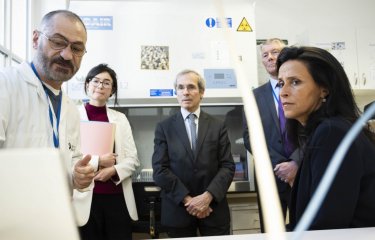On September 12, the Institut Pasteur hosted a debate entitled "Sepsis – uniting to tackle a little-known threat", under the aegis of the French Ministry for Solidarity and Health. Sepsis is the term used internationally to describe a systemic inflammatory response to severe infection. As well as raising awareness of this unknown disease, the debate highlighted the measures taken by the French General Directorate of Health.
Is sepsis a public health issue in France? For children? For adults? How is this disease treated? How can infection be controlled? These questions were addressed by experts during the event, which was also attended by representatives of learned societies, invited by the French General Directorate of Health. Discussions ended with a round table on the theme: "Developing a roadmap to combat sepsis".
Professor Stewart Cole, President of the Institut Pasteur, opened the debate, emphasizing that "sepsis is the most serious complication of infection, regardless of the pathogen responsible". He added that "despite huge efforts by the scientific community, there is still no treatment for sepsis, except infection control", and noted that tremendous commitment is required to improve the impact of sepsis and its treatment, with strong involvement from healthcare professionals. The President also paid tribute to Jean-Marc Cavaillon's contribution to research on sepsis. This Institut Pasteur scientist is an expert in the topic. Along with representatives from 12 learned societies, Jean-Marc Cavaillon is part of a working group on sepsis, set up by the French General Directorate of Health and chaired by Professor Djillali Annane, who led the debate on September 12.
The working group has been given the task of providing a detailed analysis of the sepsis situation in France, which will serve as a basis for future measures to improve the treatment of patients affected by the disease. This will involve:
- evaluating the current situation with regard to prevention, diagnosis and clinical treatment of sepsis in France,
- analyzing World Health Organization (WHO) recommendations and proposing a tailored action plan setting out priorities to tackle the situation in France.
Note that the 70th World Health Assembly, in May 2017, drew up a series of recommendations to improve the prevention, diagnosis and clinical management of sepsis aimed at WHO Member States (in French). The World Health Assembly recognized sepsis as a global health priority and asked member states to take appropriate steps to reduce its global impact, hence the steps taken by the General Directorate of Health in France.
The public debate organized by the Institut Pasteur on September 12, 2018 not only raised awareness of this little-known disease but also the measures introduced by the French General Directorate of Health regarding the topic.
Sepsis in figures
- Every five seconds, someone dies of sepsis somewhere in the world.
- In industrialized countries, 95 cases of sepsis are reported for every 100,000 inhabitants in the under 65 age group and 1,220 cases are recorded for the over 65s.
- Neonatal sepsis kills an estimated 350,000 newborns every year.
For more information, please visit






